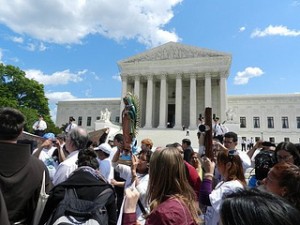Supreme Court Avoids Racial Profiling Issue
 By Griselda Nevarez and Raisa Camargo, Voxxi
By Griselda Nevarez and Raisa Camargo, Voxxi
Just as the Obama administration Solicitor General Donald Verrilli began speaking, Chief Justice John Roberts said the core problem in the Arizona v. U.S. case does not center on whether the law leads to racial profiling — virtually cutting off further discussion of that issue.
This disappointed many of the law’s opponents who have been arguing the opposite.
Since Arizona Gov. Jan Brewer signed SB 1070 into law two years ago, its critics have claimed that the law’s provision that requires police officers to question the immigration status of those they suspect are in the country illegally would subject Hispanics and others to racial profiling and improper investigations by police.
That portion of the law is among the four provisions that the eight justices are reviewing. Justice Elena Kagan recused herself from the case.
Rep. Luis Gutierrez (D-Ill.) said he is concerned Arizona’s immigration law would lead to police officers pulling people over based on “the color of your skin, accent of your voice or your hat.” He said he is disappointed the justices did not include that in the discussion.
“I think once you take off the table the argument of racial profiling and discrimination and prejudice… you lose a lot of the basic core ammunition you need to win this case,” Gutierrez said.
Following the oral arguments, former state Sen. Russell Pearce — who introduced the controversial measure and was later voted out of office in a November recall election — said the justices clearly understood that it’s not so much about racial profiling. Instead, he said, “it’s more about Arizona’s right, its state right, to enforce federal law in a dignified manner.”
Gov. Brewer told reporters she is confident Arizona will succeed.
“Racial profiling is wrong and it’s against the law,” she said. “We amended (SB 1070) to make sure that it wouldn’t happen.”
Seven days after Brewer signed SB 1070 into law, she signed another bill that modified SB 1070′s text to say police officers can’t investigate complaints based on race, color or national origin. It also said police can only ask for the immigration status of an individual during a lawful stop, detention or arrest.
But even with its modifications, Arizona state Sen. Steve Gallardo (D-Phoenix), a vocal opponent of the law, said he still fears the law would open the door to racial profiling.
He added that even before SB 1070 was born, racial profiling by police officers had already been occurring in Arizona and that it is “unfortunate” the issue was not discussed in the oral arguments.
“It’s a key portion and it needs to be dealt with,” he said.
Gallardo was among those who testified Tuesday before a Senate’s Judiciary subcommittee on immigration, refugees and border security on how the law has terrorized and split families in Arizona.
Long before SB 1070, Arizona state legislators had already been passing tough immigration regulations, hoping to stop the flow of undocumented immigrants and force those living in the state to leave.
In 2004, voters passed a law that requires people to present proof of citizenship before they can apply for public benefits. Two years later, voters approved a measure that mandates undocumented college students to pay out-of-state tuition and bans them from receiving state or federal financial aid.
These laws have motivated 100,000 undocumented immigrants, or 25 percent of the Arizona’s undocumented population, to leave the state, weakening an already lagging economy. SB 1070’s opponents also say that before the law, communities had already been living in fear; the legislation only made people go deeper into hiding.
Maria Elena Hincapie, the executive director of the National Immigration Law Center (NILC), said the Supreme Court missed one of the core concerns immigrant-rights leaders have been advocating against.
“I was very cold inside the Supreme Court, physically and spiritually,” she said. “Spiritually because this law, this un-American law, this law that violates our civil and human rights was being analyzed solely based on the clauses and provisions of the law.”
Hincapie said her group will continue to fight until they repeal copycat laws that were passed in Utah, Alabama, Indiana, Georgia, and South Carolina.
Several civil rights lawsuits have also been filed against the immigration law, including one by the NILC, the American Civil Liberties Union and the Mexican American Legal Defense and Educational Fund.
The backlash against the law has provoked a heightened sense of political activism in the Latino community, which civil rights organizations, such as the National Council of La Raza, say will manifest into votes come November.
“All you’re seeing here today is preparation for that decision. We need to hope for the best, but be prepared for the worst,” said NCLR president, Janet Murguia.
NCLR is sprucing up efforts to mobilize Latino voters. The organization projects 12.2 million Latinos will head to the polls in November.
Griselda Nevarez and Raisa Camargo are staff writers for Voxxi.
This article was first published in Voxxi.
[Photo by Mexicanos Sin Fronteras]
